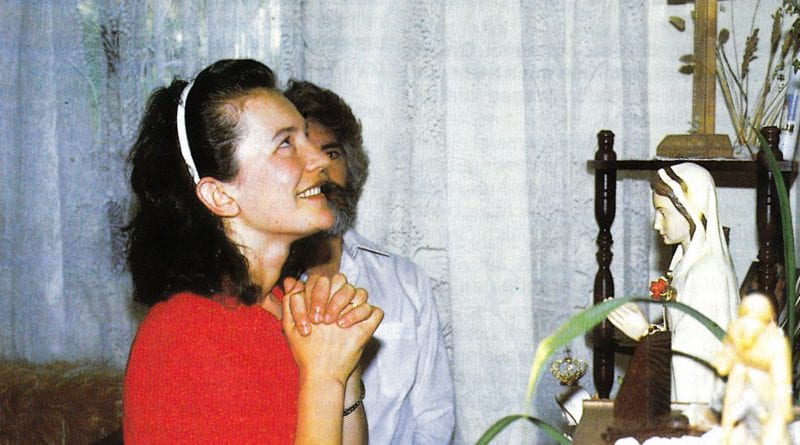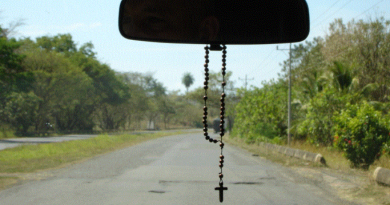The Pope, “Here is the way to holiness for everyone”

“The middle class of holiness”
In the first chapter, the Pope invites us not to think only of saints “already beatified and canonized” and recalls that “ We are never completely ourselves unless we belong to a people”. That is why no one is saved alone, as an isolated individual…”. (6) “ I like to contemplate the holiness present in the patience of God’s people: in those parents who raise their children with immense love, in those men and women who work hard to support their families, in the sick, in elderly religious who never lose their smile… Very often it is a holiness found in our next-door neighbours, those who, living in our midst, reflect God’s presence. We might call them “the middle class of holiness” (7).
The Lord calls everybody
Francis invites us not to be discouraged in the face of “models of holiness that seem unattainable”, because we must follow “the unique and specific way that the Lord has in store for us”. (11). The Pope explains that there are also “feminine styles of holiness” (12) and reiterates that to be holy “it is not necessary to be bishops, priests, religious or religious. Many times we are tempted to think that holiness is reserved for those who have the possibility of keeping a distance from ordinary occupations, to devote much time to prayer. That is not the case. We are all called to be saints by living with love and offering each one our own witness in our daily occupations. (14)
The holiness of small gestures
The Pope recalls that holiness “will grow through small gestures.
Here is an example: a woman goes shopping, she meets a neighbour and they begin to speak, and the gossip starts. But she says in her heart: “No, I will not speak
badly of anyone”. This is a step forward in holiness. Later, at home, one of her
children wants to talk to her about his hopes and dreams, and even though she is tired, she sits down and listens with patience and love. That is another sacrifice
that brings holiness…”. (16) “May you come to realize what that word is, the message of Jesus that God wants to speak to the world by your life”. (24)
Commitment in the world is no “distractionˮ
The Pope writes that “It is not healthy to love silence while fleeing interaction with others, to want peace and quiet while avoiding activity, to seek prayer while disdaining service” (26). Sometimes “we are tempted to relegate pastoral engagement or commitment in the world to second place, as if these were “distractions” along the path to growth in holiness and interior peace” (27). This does not mean “ignoring the need for moments of quiet, solitude and silence before God. Quite the contrary.” “The presence of constantly new gadgets, the
excitement of travel and an endless array of consumer goods at times leave no room for God’s voice to be heard.” (29). The invitation is to “not be afraid of holiness. It will take away none of your energy, vitality or joy.” (32).
Two subtle enemies of holiness
In the second chapter, Francis warns against two “subtle enemies”, Gnosticism and Pelagianism: “two forms of doctrinal or disciplinary security that give rise “to a narcissistic and authoritarian elitism, whereby instead of evangelizing, one analyses and classifies others, and instead of opening the door to grace, one exhausts his or her energies in inspecting and verifying” (35). “Here we have to be careful: this attitude, the Pope warns, It can be present within the Church. Gnostics think that their explanations can make the entirety of the faith and the Gospel perfectly comprehensible. They absolutize their own theories and force others to submit to their way of thinking” (39).
The false prophets
“When somebody has an answer for every question- the Pope writes – it is a sign that they are not on the right road. They may well be false prophets… God
infinitely transcends us; he is full of surprises. We are not the ones to determine
when and how we will encounter him; the exact times and places of that encounter are not up to us. Someone who wants everything to be clear and sure presumes to control God’s transcendence.” (41). Francis recalls that “ It is not easy to grasp the truth that we have received from the Lord. And it is
even more difficult to express it. So we cannot claim that our way of understanding this truth authorizes us to exercise a strict supervision over others’ lives.” (43). The doctrine, or better, our understanding and expression of it, “is not a closed system, devoid of the dynamic capacity to pose questions, doubts, inquiries…” (44).
Relying on one’s own strengths
Those who yield to this “pelagian or semi-pelagian mindset, even though they
speak warmly of God’s grace, “ultimately trust only in their own powers and feel superior to others because they observe certain rules or remain intransigently
faithful to a particular Catholic style.” “They fail to realize that “not everyone
can do everything”,47 and that in this life human weaknesses are not healed
completely and once for all by grace” (49). “Grace – recalls Francis – because it builds on nature, does not make us superhuman all at once” (50).
Egocentric attitudes
“ The saints avoided putting trust in their own works” (54), the Pope writes. “ We must first belong to God, offering ourselves to him who was there first, and entrusting to him our abilities, our efforts, our struggle against evil and our creativity, so that his free gift may grow and develop within us” (56). But there are Still, some Christians insist on taking another path, that of justification by their own efforts”. The result is a self-centred and elitist complacency, bereft of true love” and this finds expression in a variety of apparently unconnected ways “of thinking and acting: an obsession with the law, an absorption with social and political advantages, a punctilious concern for the Church’s liturgy, doctrine and prestige, a vanity about the ability to manage practical matters “ (57). “Not infrequently, contrary to the promptings of the Spirit, the life of the Church can become a museum piece or the possession of a select few. This can occur when some groups of Christians give excessive importance to certain rules, customs or ways of acting” (58).
Charity at the core
“We do well to keep reminding ourselves – the Pope concludes – that there is a hierarchy of virtues that bids us seek what is essential” (60). In other words: “ In other words, amid the thicket of precepts and prescriptions, Jesus clears a way to seeing two faces, that of the Father and that of our brother” (61).
Today’s Beatitudes
In chapter three, Francis presents the evangelical beatitudes as “the Christian’s identity card”. And he reads them again, updating them.
“Blessed are the poor in spirit, for theirs is the kingdom of heaven”
“On the contrary, Wealth ensures nothing. Indeed, once we think we are rich, we can become so self-satisfied that we leave no room for God’s word, for the love of our brothers and sisters, or for the enjoyment of the most important things in life” (68).
“Blessed are the meek, for they will inherit the earth”
“ These are strong words in a world that from the beginning has been a place of
conflict, disputes and enmity on all sides, where we constantly pigeonhole others on the basis of their ideas, their customs and even their way of speaking or dressing” (71). The Pope recalls that “Even when we defend our faith and convictions, we are to do so “with meekness”, and even “our enemies too are to be treated “with meekness”. “In the Church we have often erred by not embracing this demand of God’s word”. (73).
“Blessed are those who mourn, for they will be comforted”
“ A person who sees things as they truly are and sympathizes with pain and
sorrow is capable of touching life’s depths and finding authentic happiness “ (76).
“Blessed are those who hunger and thirst for righteousness, for they will be filled”
“Jesus offers a justice other than that of the world, so often marred by petty
interests and manipulated in various ways. Experience shows how easy it is to
become mired in corruption, ensnared in the daily politics of quid pro quo, where
everything becomes business” (78). “ This has nothing to do with the hunger and thirst for justice that Jesus praises”.
“Blessed are the merciful, for they will receive mercy”
“ In everything, do to others as you would have them do to you”. The Catechism reminds us that this law is to be applied “in every case” (80). Jesus, recalls the Pope, does not say, “Blessed are those who plot revenge”. He calls “blessed” those who forgive and do so “seventy times seven” (82).
“Blessed are the peacemakers, for they will be called children of God”
“ The world of gossip, inhabited by negative and destructive people, does not bring peace”, Francis writes (87). While Peacemakers truly “make” peace; they build peace and friendship in society.” (88). Although, he recognizes, “It is not easy to “make” this evangelical peace, which excludes no one but
embraces even those who are a bit odd, troublesome or difficult, demanding,
different “ (89).
“Blessed are those who are persecuted for righteousness’ sake, for theirs is the
kingdom of heaven”
“ Unless we wish to sink into an obscure Mediocrity – the Pope warns – let us not long for an easy life, for “whoever would save his life will lose it” (90). “ In living the Gospel, we cannot expect that everything will be easy “ (91). But Francis also explains that “ The saints are not odd and aloof, unbearable because of their vanity, negativity and bitterness. The Apostles of Christ were not like that”. The apostles enjoyed favour “with all the people” (93). As ”Persecutions are not a reality of the past, for today too we experience them, whether by the shedding of blood, as is the case with so many contemporary martyrs, or by more subtle means, by slander and lies” (94).
The Great criterion which we will be judged on
Francis recalls Jesus’ words about feeding the hungry and welcoming foreigners, presenting them as “a rule of behavior by which we will be judged. “ If I encounter a person sleeping outdoors on a cold night, I can view him or her as an annoyance, an idler, an obstacle in my path a troubling sight, a problem for politicians to sort out… Or I can respond with faith and charity, and see in this person a human being with a dignity identical to my own, a creature infinitely loved by the Father, an image of God, a brother or sister redeemed by Jesus Christ. That is what it is to be a Christian! (98).
The NGO risk and distrust of social engagement
Unfortunately, Francis writes, “ideologies lead us at times to two harmful errors”. On the one hand, there is the error of those Christians who separate these Gospel demands from their personal relationship with the Lord, from their interior union with him, from openness to his grace. Christianity thus becomes a sort of NGO, stripped of the “ luminous mysticism” (100). “The other harmful ideological error is found in those who find suspect the social engagement of others, seeing it as superficial, worldly, secular, materialist, communist or populist” (101).
Defend Life… All of it
“Our defence of the innocent unborn, for example – writes the Pope – needs to
be clear, firm and passionate, for at stake is the dignity of a human life, which is
always sacred… Equally sacred, however, are the lives of the poor, those already born, the destitute, the abandoned and the underprivileged, the vulnerable infirm and elderly exposed to covert euthanasia, the victims of human trafficking, new forms of slavery, and every form of rejection… We cannot uphold an ideal of holiness that would ignore injustice in a world” (101).
Migrants (and bioethics)
The Pope inserts here a fine-tuning on migrants. “ We often hear it said that, with respect to relativism and the flaws of our
present world, the situation of migrants, for example, is a lesser issue. Some
Catholics consider it a secondary issue compared to the “grave” bioethical questions. That a politician looking for votes might say such a thing is understandable, but not a Christian… Can we not realize that this is exactly what Jesus demands of us, when he tells us that in welcoming the stranger we welcome him? (102). Therefore, Francis clarifies “ This is not a notion invented by some Pope, or a momentary fad.” (103).
Not only worship, prayer and ethical norms
“ We may think – Francis points out – that we give glory to God only by our worship and prayer, or simply by following certain ethical norms”, and “forget that the ultimate criterion on which our lives will be judged is what we have done for others” (104). “ Those who really wish to give glory to God by their lives, who truly long to grow in holiness, are called to be single-minded and tenacious in their practice of the works of mercy “ (107).
The Risks of consumerism
“ Hedonism and consumerism – Francis warns can prove our downfall, for when we are obsessed with our own pleasure, we end up being all too concerned about ourselves and our rights, and we feel a desperate need for free time to enjoy ourselves… Similarly, when we allow ourselves to be caught up in superficial information, instant communication and virtual reality, we can waste precious time and become indifferent to the suffering flesh of our brothers and sisters” (108).
The saint, the risks of the web and the Catholic media
In chapter four, Francis presents a “few signs or spiritual attitudes” that are “necessary” for the saint’s lifestyle. It begins with endurance, patience and meekness. “Christians too- the Pope writes referring to the sphere of blogs and sites – can be caught up in networks of verbal violence through the
internet and the various forums of digital communication… Even in Catholic media, limits can be overstepped, defamation and slander can become commonplace, and all ethical standards and respect for the good name of others can be abandoned”. “ It is striking that at times, in claiming to uphold the other commandments, they completely ignore the eighth, which forbids bearing false witness or lying, and ruthlessly vilify others “ (115). The saints, recalls Francis, “ do not waste energy complaining about the failings of others, they can hold their tongue before the faults of their brothers and sisters, and avoid the verbal violence that demeans and mistreats others “ (116). “It is not good when we look down on others like heartless judges, lording it over them and always trying to teach them lessons. That is itself a subtle form of violence” (117).
The necessary humiliations
“Humility – explains Pope Bergoglio – can only take root in the heart through humiliations. Without them, there is no humility or holiness “ (118). Francis is not speaking “about stark situations of martyrdom, but about the daily humiliations of those who keep silent to save their families, who prefer to
praise others rather than boast about themselves, or who choose the less welcome tasks, at times even choosing to bear an injustice so as to offer it to the Lord “ (119).
Joy and good humor
The Pope emphasizes that what has been said so far “ being timid, morose, acerbic or melancholy, or putting on a dreary face. the saints are joyful and full of good humour. Though completely realistic, they radiate a positive and hopeful spirit “ (122). Thus “Ill humour is no sign of holiness “ (126). Francis intends to refer to “a joy lived in communion, which shares and is shared “ (128).
Boldness and Passion
Bergoglio summarizes these elements in a word: “ Boldness, enthusiasm, the freedom to speak out, apostolic fervour, all these are included in the word parrhesí “ (129). “ Look at Jesus. His deep compassion reached out to others. It did not make him hesitant, timid or self-conscious, as often happens with us. Quite the opposite. His compassion made him go out actively to preach and to send others on a mission of healing and liberation” (131). Therefore, we must overcome the temptation “ to flee to a safe haven: It can have many names: individualism, spiritualism, living in a little world, addiction, intransigence, the rejection of new ideas and approaches, dogmatism, nostalgia, pessimism, hiding behind rules and regulations (134).
God is eternal newness
“God is eternal newness – Francis writes – He impels us constantly to set out anew, to pass beyond what is familiar to the fringes and beyond… we will find him there; indeed, he is already there (135). The Pope recalls that the example of many priests, religious and laity “ who devote themselves to proclamation and to serving others with great fidelity, often at the risk of their lives and certainly at the cost of their comfort… Their testimony reminds us that, more than bureaucrats and functionaries, the Church
needs passionate missionaries, enthusiastic about sharing true life. The saints
surprise us, they confound us, because by their lives they urge us to abandon a dull
and dreary mediocrity” (138). And Francis also recalls how difficult it is “to fight against concupiscence, the snares and temptations of the devil and the selfishness of the world.” (140). It is therefore important “The common life, whether in the family, the parish, the religious community or any other, is made up of small everyday things “ (143): It was also true of the life that Jesus shared with his disciples and with ordinary people. Let us not forget that Jesus asked his disciples to pay attention to details.
Prayer and Adoration
“ Finally, though it may seem obvious – Francis points out – we should remember that holiness consists in a habitual openness to the transcendent, expressed in prayer and adoration “ (147). The Pope asks: “Are there moments when you place yourself quietly in the Lord’s presence, when you calmly spend time with him, when you bask in his gaze? (151). But this prayerful silence is not “ a form of escape and rejection of the world around us “ (152).
Fighting the Devil
The fifth chapter warns that the path to holiness is also “ constant struggle against the devil, the prince of evil.” (159). The “evil” mentioned in the Our Fatherwould be “the evil one”. It indicates a personal being who assails us.” (160) Hence, we should not think of the devil as a myth, a representation, a symbol, a figure of speech or an idea. This mistake would lead us to let down our guard to grow careless and end up more vulnerable. The devil does not need to possess us. He poisons us with the venom of hatred, desolation, envy and vice.” (161). And it can lead to “spiritual corruption”, which “ is worse than the fall of a sinner, for it is a comfortable and self-satisfied form of blindness. For everything then appears acceptable” (165).
The way of discernment
“ How can we know if something comes from the Holy Spirit or if it stems from
the spirit of the world or the spirit of the devil? The only way – Francis recalls – is is through discernment, which calls for something more than intelligence or common sense. It is a gift which we must implore.” (166). “Nowadays – continues the Pope The gift of discernment has become all the more necessary… All of us, but especially the young, are immersed in a culture of zapping. Without the wisdom of discernment, we can easily become prey to every passing trend.” (167). This discernment “is necessary not only at extraordinary times, when we need to resolve grave problems and make crucial decisions”. “ It is a means of spiritual
combat for helping us to follow the Lord more faithfully Often discernment is exercised in small and apparently irrelevant things, since greatness of spirit is manifested in simple everyday realities”. Therefore the Pope asks “all Christians not to omit, in dialogue with the Lord, a sincere daily “examination of conscience” (169).
Listen to and renounce to your own mental schemes
Only “if we are prepared to listen -concludes Francis – do we have the freedom to set aside our own partial or insufficient ideas, our usual habits and ways of seeing things. In this way, we become truly open to accepting a call that can shatter our security, but lead us to a better life.” (172). This attitude “ this attitude of listening entails obedience to the Gospel as the ultimate standard, but also to the Magisterium that guards it, as we seek to find in the treasury of the Church whatever is most fruitful for the “today” of salvation. It is not a matter of applying rules or repeating what was done in the past”, because “same solutions are not valid in all circumstances and what was useful in one context may not prove so in another. The discernment of spirits liberates us from rigidity, which has no place before the perennial “today” of the risen Lord” (173).





